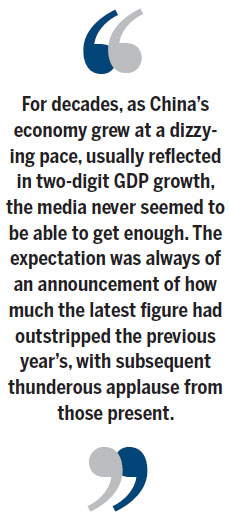The 100-minute countdown to an apocalypse
Updated: 2015-03-06 07:47
By Fu Jing(China Daily Europe)
|
|||||||||||
Documentary on environment throws new light on the importance of the new normal
A 100-minute video documentary on China's appalling environmental pollution that was released last month has drawn a huge amount of attention and comment on the Internet. Some are even saying the film, Under the Dome, produced by Chai Jing, a former CCTV anchor, at her own expense, is a match for the landmark book Silent Spring by the American author Rachel Carson, published in 1962, which alerted the world to the damage that indiscriminate pesticides did to the environment, and The Limits to Growth, commissioned by the Club of Rome and published in 1972, which looked at the future effects on the planet of economic and population growth.
National deputies and members of China's top political advisory and legislative bodies are now holding their annual meetings in Beijing, and Chai has helped set the agenda of discussions for them in coming weeks.
In making her documentary Chai came to the conclusion that the burning of fossil fuels, especially coal and oil, is responsible for the bulk of China's air pollution. She looked at the consequences of smog and possible solutions.

As a result of the huge amount of attention the video has attracted, some are saying it has helped alert ordinary Chinese of the need to live environmentally friendly lives if the country is to solve its air pollution problems.
Of course, such problems affect each and every person living in China, so it has not been hard for Chai to draw people to her video, but it is made all the more compelling by her personal story. Immediately after she gave birth to her daughter, the girl had to undergo a tumor operation, even before Chai had the chance to see her.
In an interview, Chai said: "If I was alone, I could live for decades. But I have a daughter, and this is about the continuation of life."
It was her feelings of maternal responsibility that inspired her to make the film, she says.
The film is even relevant when one comes to discuss the oft talked about "new normal" in Chinese economics, because a lid is already being put on the environmental ills that Chai looks at. That is being done by putting a brake on high-speed growth and by searching for new growth engines and innovation-driven models.
That means that media covering this year's two sessions in Beijing will also need to adopt a new way of thinking as they report proceedings.
For decades, as China's economy grew at a dizzying pace, usually reflected in two-digit GDP growth, the media never seemed to be able to get enough. The expectation was always of an announcement of how much the latest figure had outstripped the previous year's, with subsequent thunderous applause from those present.
In contrast, before Premier Li Keqiang announced his government's 2015 target on March 5 as he opened this year's session of the National People's Congress, the media speculated about GDP growth slipping yet again.

As falling GDP growth each year has begun to be treated as a given, the phrase new normal has itself become the norm in describing a country that is changing gear so its economy can grow at a speed of medium to high.
Anyone in China is likely to understand how this change of gear relates to the country's environmental problems. In the West, commentators are often preoccupied by the global impacts of China's economic restructuring, even as they find fault with the country over its environmental pollution.
Such critics are prone to look at these issues separately, even though the writing has been on the wall for decades about finite resources, pollution and population growth.
With economic output of more than $10 trillion last year, twice as large as that of Japan but still behind that of the US, China's GDP growth of 7.4 percent is not far off what it has been in recent years.
Indeed that extra $740 billion of growth alone equates to the annual output of a country with a world ranking of 18, and surpasses that of Switzerland and the Netherlands.
So even as China's growth slows, it is pointless to worry about whether the country will continue to make a solid contribution to the global economy.
In fact, the most important thing is not growth itself, but the quality of that growth. In this regard, there can be no better return to the people of China than an improved environment, including fresh air and clean water. Chai's documentary makes it clear that to achieve that, progress needs to be made in the next five years. If that is not done, the results hardly bear contemplating.
The author is China Daily chief correspondent in Brussels. Contact the writer at fujing@chinadaily.com.cn
(China Daily European Weekly 03/06/2015 page12)
Today's Top News
Bright Food continues with overseas expansion
China lowers annual GDP growth target to 7%
China faces 'formidable challenges'
Diplomats talk about 'two sessions'
US ambassador to S.Korea attacked
Belgian royal couple to visit China
China faces 'formidable challenges', says Li
China's defense budget to rise about 10%
Hot Topics
Lunar probe , China growth forecasts, Emission rules get tougher, China seen through 'colored lens', International board,
Editor's Picks

|

|

|

|

|

|





